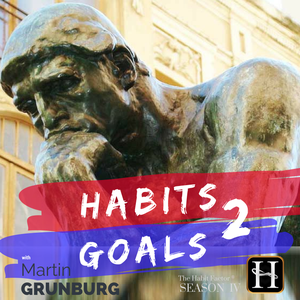
Habits 2 Goals: The Habit Factor® Podcast with Martin Grunburg
Martin Grunburg
Habits of health, Habits to goals, Habits for Success
- 21 minutes 48 secondsThree, 3-Letter Words That Can Change Your Life
FOMO: The Habit Mastery Workshop. Begins 1/17/25 Special promo code: “HMASTERY50” expires tonight.
“Where there is hope in the future, there is happiness in the present."
Language shapes our logic and thoughts. Small shifts in the words we use can unlock big changes—just like a simple line of programming code.
Consider these three simple, three-letter words: YET, GET, AND.
YET
Yet is about hope.
When kids (or adults) feel stuck, they often use absolute language: “I’m just no good at this.”
By simply adding yet, we shift the story: “I’m not good at this... yet.”
Yet is a word that turns frustration into possibility, reminding us that growth is within reach.
“Yet” suggests hope, which lights the way forward and, as the quote goes, can bring “happiness to the present.”
GET
GET is about gratitude.
When you catch yourself thinking, “I have to do the dishes,” “I have to go to work,” “I have to go to the gym,” or “I have to go to practice,” consider changing the programming language to: “I get to.”
After all, you possess hands to clean with, eyes to see with, and opportunities others may not have.
Get transforms obligation into appreciation.
Get opens your eyes to the gifts within everyday “tasks.”
AND
And is about openness. It challenges rigid, either/or thinking.
Are habits better than goals?
No—habits and goals support each other.
Is pressure good or bad?
It’s both—too little can leave you unmotivated, while the right amount sharpens focus.
By adding and to your programming, you remove silos.
And welcomes holistic thinking and, interestingly enough, fosters peace of mind.
Consider adding these tiny three words—YET, GET, AND—and watch how they reshape how you see yourself and the world.
After all, it’s easy to see how hope, gratitude, and openness pave the way to growth, happiness, and harmony.
"The limits of my language are the limits of my world." ~Ludwig Wittgenstein
Language is both a bridge and a barrier.
It connects us to new ideas and can divide and constrain us.
By choosing our words carefully—and sometimes setting aside prevailing definitions to explore their roots—we open up possibilities instead of closing them off.
This is a public episode. If you’d like to discuss this with other subscribers or get access to bonus episodes, visit habits2goals.substack.com/subscribe13 January 2025, 3:18 pm - 13 minutes 38 secondsAttention: You Don’t Stand a Chance.
“What holds your attention, tends to hold your future.”
In today’s hyper-connected world, staying focused feels nearly impossible.
Algorithms are designed to serve up distractions tailored to our deepest interests.
Case in point: I recently visited YouTube for instructions and was immediately bombarded with an irresistible buffet of videos—chess, surfing, golf, etc…
Within 30 seconds, I forgot what I was even looking for.
Sound familiar?
The battle for your attention isn’t just a minor inconvenience—it’s a full-scale assault on your productivity, your goals, and your future.
Every moment we surrender to distractions, we’re not just losing time; we’re forming habits of fractured attention and diminished focus.
By being proactive and intentional, you can reclaim your attention and your future.
Key Ideas to Guard Your Attention:
Out of Sight, Out of Mind (and its Corollary): Removing distractions from your environment works wonders: the less you see, the less tempted you’ll be. Delete non-essential apps, declutter your workspace, and turn off notifications. But here’s the kicker: Out of Mind, Out of Sight. As soon as your attention fragments, your focus and the mental “sight” of your project leave you. Once the vision of what you’re working on fades, it’s as if the task itself disappears. Protect your attention, and you protect your inner vision.
Create Attention Sanctuaries: Dedicate specific times and spaces for deep work. A clean, distraction-free desk and a phone left in another room can work wonders.
Guardrails for Your Mind:
Pomodoro Technique: Work in focused bursts (e.g., 25 minutes), then take short breaks. This prevents burnout and builds focus and stamina.
Phone in DND: Set your phone to “Do Not Disturb” during work blocks. Use tools like Focus Mode to block distracting apps.
Single-Tasking Over Multitasking: Do one thing at a time and do it well. Multitasking splinters attention and increases mistakes.
Recognize Environmental Triggers:Social media apps, autoplay features, and algorithm-driven feeds are designed to hook you. Acknowledge these triggers and implement barriers:
Use browser extensions like Freedom or StayFocusd to limit time on certain websites.
Log out of accounts when not actively using them.
Reflect and Realign:
Set daily intentions: What’s the one thing you need to accomplish today?
End your day with a quick reflection: Did you win the battle for your attention? What could you adjust tomorrow?
Write It Down:The simplest yet most effective way to keep your focus is to write things down. As Confucius said, “The weakest ink is stronger than the strongest memory.”
Writing anchors your thoughts reinforces your goals, and provides a clear roadmap when distractions inevitably pull you away. The act of revisiting your notes restores clarity and commitment.
This is a public episode. If you’d like to discuss this with other subscribers or get access to bonus episodes, visit habits2goals.substack.com/subscribe6 January 2025, 5:58 pm - 24 minutes 25 secondsFinish Strong
“It’s not how you start that matters, it’s how you finish.” ~Michael Jordan
»Tired of spinning your wheels? One course can change everything » The Habit Mastery Workshop. Begins 1/17/25
Let’s talk about finishing strong. Does anyone remember who led at halftime, anyway?
Whether it’s the final reps of a workout, the last chapter of a book, the home stretch of a goal, or the end of the year, finishing with purpose and intensity changes everything.
The act of finishing strong isn't just motivational fluff; it's a game-changer for habit-building, self-confidence, and—bonus—a sweet dopamine rush.
Benefits of Finishing Strong
Supercharges Confidence: Ending on a high note convinces your brain you’re the kind of person who executes on a plan and finishes what they start. When your last mile is faster than your first mile—you’re finishing strong! Finishing what you plan—even small tasks (behaviors you’re looking to cultivate into habits)—produces self-efficacy. Self-efficacy is the cornerstone of The Habit Factor’s P.A.R.R., habit-building methodology.
Reinforces Habit Strength: Imagine your habit as a snowball rolling downhill. Finishing strong reinforces your commitment; it grows larger and faster and gains momentum with each successful completion.
Brain Candy: When you complete a task—almost any task you set out to accomplish—your brain rewards you with dopamine, serotonin, oxytocin, and endorphins. Bonus: all these feel-good chemicals help to reinforce your motivation to get back after it!
Tomorrow Meets a Stronger You: Today’s strong finish equates to you rejoining that next practice effort even stronger. You’re essentially handing future-you a gift—you’re paying it forward with each strong finish!
Laser Focus: Aiming to finish strong forces you to up the ante—increase the energy, intensity, and focus.
“A good start’s a joyful run, but finishing strong is second to none.”
P.A.R.R. and Finishing Strong
The Habit Factor’s P.A.R.R. methodology (Plan, Act, Record, Reassess) sets you up for a strong finish by helping you to establish a “low bar”—making finishing strong easier.
How it all connects:
Plan: Start with your habit’s “Target Days” are they (M, W, F) or (Tu, Th)? Notice they do NOT need to be every day. You select the days that work with you and your schedule. Then, identify the “Minimum Success Criteria” (MSC)—the “low-bar” part of your habit-building plan. For instance, 5 pushups or 25 pushups? Writing for 10 minutes or 10 pages?
Act: Each action (according to your plan) becomes a mini-finish line. Crush it on your target days, and you’re already finishing strong at a micro-level, which keeps the momentum building.
Record: Track your progress against your “Targets” and build accountability. The more you see wins stack up, the easier it is to keep finishing strong.
Reassess: Reflecting on what worked (and what didn’t) ties a neat bow on your efforts and preps you for the next challenge.
When you approach habits with P.A.R.R., you’re not just grinding—you’re creating a cycle of intentional starts and triumphant finishes.
How to Finish Strong
Set Your Sights on Small Wins: Small helps to get started—convincing yourself it’ll be easy to start. Establishing low “Minimum Success Criteria” on your “Target Days” is the secret weapon of P.A.R.R., which works to help get started AND to finish strong.
Consistency Beats Intensity: Skip the “all or nothing” mindset. Show up consistently and let habit strength compound over time.
Plan to Win: Strong finishes rarely happen by accident. Decide in advance if you’ll be exceeding your “Minimum Success Criteria.” Not so you can get two checks—but so you’ll finish strong and show up next time even stronger.
Reflect and Celebrate: Celebration is almost instantaneous as your natural reward systems—endorphins and neurotransmitters like serotonin and dopamine—will kick in every time you complete your “Minimum Success Criteria” on your “Target Days.” It won’t just be a mental high-five… it’ll be an emotional one that will keep you pumped and motivated as you prove self-efficacy.
“Habit development cares little about bursts of energy. Habits are developed via consistency over time. The notion that you have to keep daily streaks alive or you can’t miss two days is completely a myth. Consistency over time is the key to habit development, period.”
This is a public episode. If you’d like to discuss this with other subscribers or get access to bonus episodes, visit habits2goals.substack.com/subscribe30 December 2024, 3:51 pm - 19 minutes 24 seconds“The 1% Better Everyday” Myth
“It’s the space between the notes that makes the music.” ~Debussy
**Private Coaching Accelerator (Limited Spots): Learn More Here! **
Debunking the Myth of ‘1% Better Every Day’
The idea of getting 1% better every day has been popularized by books, influencers, and motivational speakers for more than thirty years.
I recall Tony Robbins preaching the message back in the late '80s. More recently, another bestselling habit book has taken Tony’s mantra to new levels of cliché-dom.
On the surface, “1% Better Every Day” sounds fantastic, and it’s certainly aspirational.
After all, it represents consistent, steady improvement over time—day in, day out. What could be more motivational than that?
It seems like the perfect recipe for day-to-day self-improvement, right?
1% better every day.
Unfortunately, the reality is very different.
Learning any new skill, building any new habit, or improving in any meaningful way is a process filled with starts, stops, gradual and sometimes rapid progress, as well as regression.
All growth requires space—rest and silence.
After all, muscles don’t grow while you’re lifting the weights; they grow when you’re resting.
So, while the message of “1% Better Every Day” is well-meaning, it’s also a myth.
Improvement is never linear.
Ever heard the phrase “two steps forward, one step back”?
Sometimes, it may be three or even ten steps back.
Credit: The “Success” meme
“Don’t break the streak,” “Never miss two days,” “It takes 21 days to build a habit,” and “1% Better Every Day” all fall into the same silly cliché bucket when it comes to personal improvement and habit development.
And all miss the crucial idea that rest, recovery, space, and silence should be part of anyone’s growth and new skill and habit development plan.
Take a hard look at the meme above—does that resemble 1% better every day?
Yet, this (below) is what “they” want you to believe. 👇
This is a public episode. If you’d like to discuss this with other subscribers or get access to bonus episodes, visit habits2goals.substack.com/subscribe23 December 2024, 4:06 pm - 28 minutes 27 secondsWhen Life Gets Easier
“Pressure is a privelage.” ~Billie Jean King
** New Private Coaching Accelerator (Pilot): Learn More Here! **
Does it ever feel like pressure is out to get you?
For years, experts in performance psychology have told us that pressure is the “enemy of success.”
It seems logical, right?
After all, under pressure, things can go sideways. Deadlines get blown. People choke. Sometimes, terrible things happen.
But here’s the twist: pressure isn’t the bad guy.
It can be one of your most unexpected allies—if you allow it.
Think about it: What’s a deadline, if not pressure’s way of snapping us out of procrastination and forcing us to get things done?
At the Olympics—where the stakes are enormous and the pressure is sky-high—not all athletes crumble; in every Olympics, world and Olympic records are set.
Why is that?
If pressure were truly the enemy of success, why are so many ‘successful’ people known for navigating pressure-filled waters?
Consider Abraham Lincoln, Mahatma Gandhi, or Nelson Mandela. Weren’t they immersed in some of the most pressure-packed circumstances imaginable?
Isn’t their heroism defined by how they navigated that pressure, rather than crumbled under it?
Here’s the truth: Pressure isn’t inherently good or bad—it’s neutral, precisely like the force of habit.Whether we like it or not, it’s not going away anytime soon.
Pressure was with you the day you were born, and it’s certain to be with you until your final breath.
Thus, it’s probably worth understanding it better.
»New Year Special: Upgrade your membership in 2025! Enter: The Pressure Paradox® —the sequel to The Habit Factor®.
Turns out, there’s a simple mantra—a formula—for navigating pressure, and it’s detailed extensively in The Pressure Paradox®; it’s identified simply as “The 3 P’s.”
Plan. Prepare. Practice.More at: https://habits2goals.substack.com
This is a public episode. If you’d like to discuss this with other subscribers or get access to bonus episodes, visit habits2goals.substack.com/subscribe16 December 2024, 5:25 pm - 22 minutes 58 secondsThe Manifest
What’s a Manifest?
While “manifest” can function as an adjective, it is most commonly used as a noun or verb.
As a noun: A manifest is the captain’s list—a detailed record of what’s being carried and delivered to a destination.
As a verb: To manifest refers to the act of turning goals, dreams, and ideals into physical reality.
In today’s Mind Bullet, we explore the common ground between these meanings.
It’s likely no coincidence that they share the same name. The concepts are inherently connected.
To manifest your goals (verb), it’s crucial to DOCUMENT your efforts—the process itself.
This is where many TikTok and Instagram "Gooroos" get it wrong. They promise you’ll manifest your dreams simply by visualizing, repeating mantras, and meditating.
What they often overlook is this fundamental truth:
Manifestation is a process of documentation.
Read that again.
To manifest effectively, you must track where you’re headed, what’s working, and what isn’t. You need to record your actions, behaviors, and habits. (Join the waitlist here.)
The act of documenting and tracking is the manifestation bridge—the critical link between a foggy, far-off dream and seeing it take shape in reality.Why Habit Tracking Changes Everything
All captains are required to carry a manifest:
It clarifies the mission: You can’t deliver what you can’t define.
It keeps you accountable: Progress is easier to measure when it’s written down.
It shows the path forward: If you get off course, the manifest reminds you where you’re going—and why.
In your life, tracking your habits is your personal manifest. Without it, you’re just guessing whether you’re moving in the right direction.
This is a public episode. If you’d like to discuss this with other subscribers or get access to bonus episodes, visit habits2goals.substack.com/subscribe9 December 2024, 7:45 pm - 10 minutes 58 secondsBuilding The New
“The secret of change is to focus all your energy not on fighting the old but on building the new.” ~ Socrates
What are you building?
Wise words, right?
Let’s be honest—Socrates didn’t have to deal with email inboxes or social media.
Change was easier when your biggest distractions were donkeys.
Still, his message holds up.
If you’re tired of replaying your greatest bad habits hits… (Procrastination: The Remix, anyone?), it’s time to focus on building the new.
Key Ideas
Change is constant: Everything bound by time is changing—including you. Whether you like it or not, life keeps moving forward.
Let go of your EX—the past: Whether it’s a toxic habit, a dead-end goal, or your undying love for midnight ice cream binges, clinging to the old only makes it harder to build the new. The past is like that annoying ex—it’s not helping you grow, so why keep holding on?
Build, don’t battle: Ever tried arguing with yourself? It’s exhausting. Telling yourself you’ll “definitely start tomorrow” only to repeat the same old habits feels like shadowboxing your brain. Instead, channel that energy into ACTION. Dust off that dream—like writing that book you’ve been “starting” since 2012— take the first step.
Start small and keep it real: Plato said, "The beginning is the most important part of the work." Translation? S.T.A.R.T.—Simple. Today. Actions. Repeated. Tracked. Quit over-researching, overthinking, or waiting for the perfect moment. Just start—even if it’s messy.
Time is short: As Brian Tracy put it, “There’s never enough time to do everything, but there’s always enough time to do the most important things.” Stop waiting…
Today The Building Begins!
Build habits like a boss: Use the P.A.R.R. method—Plan, Act, Record, Reassess. You're a human, not a rodent stuck in a habit loop. (see below)
Listen while you build: Subscribe to the Habits 2 Goals podcast—it’s like having a coach in your pocket, but without the shouting.
Level up with accountability: Upgrade to a paid Annual Premium subscription and gain access to our upcoming Peer Accountability and Small Coaching group.
Go PRO: Enroll in the 8-Day Habit Mastery Workshop for on-demand, next-level habit and skill development. It’s structured, supportive, and (don’t worry) kale-free.
This is a public episode. If you’d like to discuss this with other subscribers or get access to bonus episodes, visit habits2goals.substack.com/subscribe2 December 2024, 9:18 pm - 24 minutes 11 secondsSuccess's Ultimate Gatekeeper
“There is no success without hardship.” ~ Sophocles
Today’s Frequently Asked Friday (FAF): What’s the one ‘habit/skill/trait’ holding me back from living the life I desire?”
The Price of Admission
Steve Jobs often said that starting and running a business is “painful and difficult.”
Elon Musk? Same tune, different key.
These guys didn’t just waltz onto the stage of success—they slogged through the swamp of pain, discomfort, frustration, and failure.
Why?
Because success is never a gift; it’s the result of grit—a prize you wrestle from life as it growls at you.
Here’s a PAINFUL truth (again): nobody is born disciplined.
Not you, not me, not even that annoying friend who crushes marathons before breakfast.
Discipline is just a dressed-up way of saying, “I’ve become really good at tolerating pain without b******g too much.”
The best part? Discipline—tolerable pain—is a learnable skill, trait, and habit, no matter how much you currently enjoy hitting the snooze button.
Make Pain Your Frenemy
Pain doesn’t have to be your eternal arch-nemesis.
The Master Key: Begin with Pain Lite™
Nobody’s asking you to climb Everest in flip-flops. Heck, even David Goggins—yes, that David Goggins—was reportedly, in his own words, a “fat, lazy slob” before he turned his life around. Need proof? Look no further than the title of his bestselling book: “Can’t Hurt Me.”
Here’s the thing: Goggins didn’t wake up one day as the poster child for superhuman discipline. He developed it—one habit at a time, by embracing discomfort and leaning into pain.
P.A.R.R. Your Way to Glory
No, this isn’t a catchy new pirate slogan—it’s a simple, proven process to help you build the habit of discipline. Consider it your battle plan:
Plan: Outline your goal or habit. What are you aiming for?
Act: Take small, consistent steps forward. Start messy if you have to—just start.
Record: Track your progress, even if it feels tedious. Writing it down creates accountability.
Reassess: Reflect on what’s working and tweak as needed. Growth is a constant experiment.
P.A.R.R. Leverages Your Executive Brain—You Are Not a Rodent
Unlike rodents, you’re not stuck in a loop of pain-and-pleasure-based survival. You’re human, which means you have access to three incredible superpowers:
Choice: You decide what’s important and where to focus your energy.
Intention/Planning: You can anticipate challenges and create strategies to overcome them.
Reflection: You’re able to look back, evaluate, and adjust your approach for better results.
Pain is inevitable, but suffering is optional.
By following The Habit Factor’s P.A.R.R. methodolgy, you can tap into your higher brain functions and break free from the automatic “pain-pleasure” cycle that drives most behavior.
So no—you don’t have to climb mountains barefoot or live like a Navy SEAL to embrace discipline.
Start small, embrace some discomfort.
This is a public episode. If you’d like to discuss this with other subscribers or get access to bonus episodes, visit habits2goals.substack.com/subscribe29 November 2024, 6:00 pm - 19 minutes 30 secondsFirst Things
“The key is not to prioritize what’s on your schedule, but to schedule your priorities.” ~ Stephen Covey
First Things First: A Football Story (Kind Of)
Picture this: it’s Sunday morning, and I’m getting some “very important work” done.
Deadlines, projects, emails—cue dramatic music—it’s all calling my name.
I’m laser-focused, in the zone.
Then, my wife comes skipping down the stairs (okay, not actually skipping):“It’s time to watch some football!”
Now, I’m not going to lie. My gut reaction? Football?! Really?!
I love football, but I knew I had to get caught up on these projects.
My inner voice insisted, “You don’t have time for this! You’ve got WORK to do!”
But then, after a poorly timed epiphany, I realized the irony. I had set out to write about “FIRST THINGS”—about putting priorities in order. Yet, saying no to football would make my wife unhappy.
Could I really write a productivity post about “first things” and then turn around and say, “No can do, wifey”?
Was I productive? Nope.
Was I effective? YES.
Did I make her happy? Yep.
And therein lies just one of the first lessons about FIRST THINGS.
Lessons in Priorities
People and Relationships > Projects and Things
Stephen Covey’s principle isn’t just about managing time; it’s about managing life—what matters most.
Few, if any, lie on their deathbed wishing they had answered more emails or finished more projects.
Almost everyone wishes they had spent more time with loved ones.
Watching football wasn’t really about the game. It was about showing my wife that she was a priority.
In the end, effectiveness always beats efficiency.
“Most people are busy, yet ineffective.”
I could’ve been “efficient,” said no, and powered through my work—but at what cost? An unhappy spouse?
True effectiveness came from trading productivity time for relationship time.
Maturity (and a few prior mistakes) are great teachers.
My younger self would’ve chosen work, believing it was the smart and responsible thing to do.
Older (and hopefully wiser) me has learned that success is less about checking boxes and more about making choices—and forging habits—that align with your values and your “ideal future.”
What Are Your First Things?
As Thanksgiving approaches, I’m reminded that gratitude and connection are our true FIRST THINGS.
Work will always be there. Time with loved ones? That’s fleeting.
One less Thanksgiving is being served up on Thursday!
So, take a moment to figure out your own “first things”—whether it’s family, friends, or simply being present.
Focus on what you value most—and be grateful for the real first things.
----
For personalized instruction on the P.A.R.R. methodology, check out the upcoming 8-Day Habit Mastery Workshop—an affordable program designed to help you build lasting habits and skills. Master on-demand habit and skill development for a lifetime, and kick off 2025 with real momentum!
This is a public episode. If you’d like to discuss this with other subscribers or get access to bonus episodes, visit habits2goals.substack.com/subscribe25 November 2024, 7:40 pm - 19 minutes 59 secondsThe ONE Requirement for Goal Attainment
“I fear not the man who has practiced 10,000 kicks once, but I fear the man who has practiced one kick 10,000 times.” ~Bruce Lee
Napoleon Dynamite got it right!
Between you and your big, shiny goal is a gatekeeper.
Any clue?
It’s the difference between doing and dreaming.
It’s skills.
Do you possess, at a high level, the skills your goal requires?
Identify 3-5 of the key SKILLS that your goal demands, and list them.
Here’s the kicker: skills and habits arrive together, like Batman and Robin—like salt and pepper—one invariably brings the other.
Picture this: you want to write a book, run a marathon, or play the piano like a pro. Big dreams, to be sure.
However, without the requisite skills/habits, these dreams will remain dreams.
Is playing the piano a skill or a habit?
Drum roll please: It’s both!
Skills don’t just appear; they grow out of relentless, boring, intentional practice—repetition.
How does one intentionally cultivate habits and skills?
By following the P.A.R.R. method for habit development (published within The Habit Factor®). P.A.R.R. stands for Plan, Act, Record, and Reassess.
Do you think this P.A.R.R. methodology sounds tedious?
You’re correct. It is.
It’s also where the rubber—your intention—meets the road—your actions.
It’s where progress, momentum, and ultimately greatness hide. Exhibit One: Steph Curry’s tedium. To him of course, it’s anything but tedious.
Steph teaches us that it’s the silent, stubborn act of showing up consistently, practicing that one shot or “kick” 10,000 times until you can do it in your sleep.
“You are rewarded in public for what you have intensely practiced and refined in private.” ~Tony Robbins
So, what’s it going to be?
Will you dream about your goals or practice them into existence?
Decide which skills/habits you need today to move closer to your most important goal.
Your future self is watching.
Enjoy the show!
~mg
Eager to put this into practice?
For personalized instruction on the P.A.R.R. methodology, check out the upcoming 8-Day Habit Mastery Workshop—an affordable program designed to help you build lasting habits and skills. Master on-demand habit and skill development for a lifetime, and kick off 2025 with real momentum!
This is a public episode. If you’d like to discuss this with other subscribers or get access to bonus episodes, visit habits2goals.substack.com/subscribe18 November 2024, 8:08 pm - 20 minutes 48 secondsIt's Not Frustrating
Messy
Life can be a real, unpredictable mess at times.
There are things within our control—and way more beyond it. (See the Behavior Echo-System).
So, we tumble through life, tripping over our expectations, cursing when things don’t go our way, and thinking the universe owes us a smoother ride.
Here’s a quick story, courtesy of the NFL.
It’s halftime. The reporter is interviewing Mike Tomlin, the Pittsburgh Steelers' Super Bowl-winning head coach. “You’ve been inside the red zone a few times and come away with nothing but field goals. Isn’t that frustrating?”
His response: “It’s not frustrating, it’s football.”
Boom.
Without pause, Tomlin dropped a truth bomb that should be knitted on pillows worldwide.
Football comes with challenges built right in. As does life.
How many of us set ourselves up for disappointment, convinced life is supposed to be a never-ending merry-go-round of cotton candy and catchy music?
We have generations of ‘kids’ growing up (thanks to social media), floating along, expecting (happiness loop - prior episode), each day to be an easy ride.
The last time I checked, life wasn’t designed for ease and comfort - feel free to thank whatever gods you’d like for that.
The good-ish news is this; when we stop expecting ease, comfort, and smoothness, we’re braced for a bumpy ride.
When we train ourselves for difficulties, the difficulties become easier.
This is a public episode. If you’d like to discuss this with other subscribers or get access to bonus episodes, visit habits2goals.substack.com/subscribe11 November 2024, 6:55 pm - More Episodes? Get the App
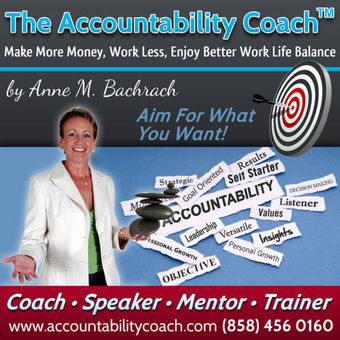 Goal Setting & Achievement Podcast: Business|Productivity
Goal Setting & Achievement Podcast: Business|Productivity
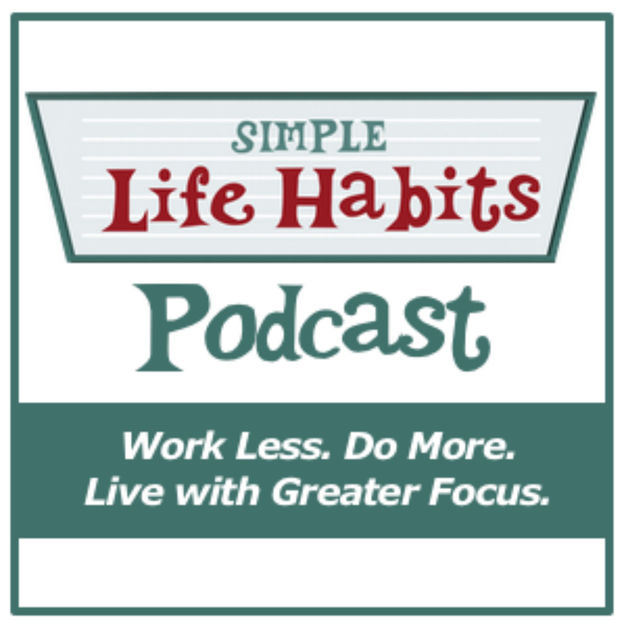 Simple Life Habits
Simple Life Habits
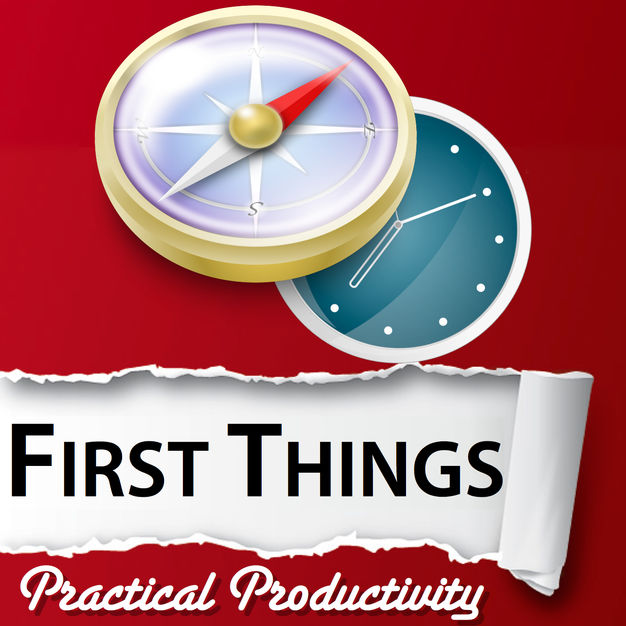 First Things
First Things
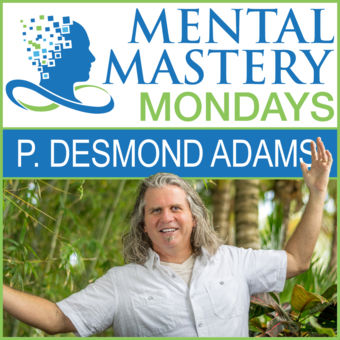 Mental Mastery Mondays | Life Purpose, Productivity, and Self-Discipline
Mental Mastery Mondays | Life Purpose, Productivity, and Self-Discipline
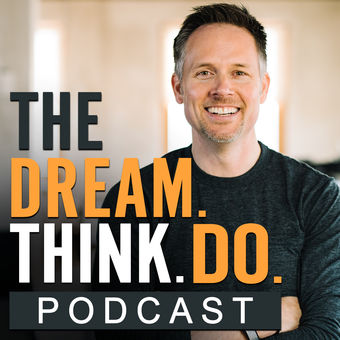 DREAM. THINK. DO. | Helping You Achieve Bigger Goals
DREAM. THINK. DO. | Helping You Achieve Bigger Goals
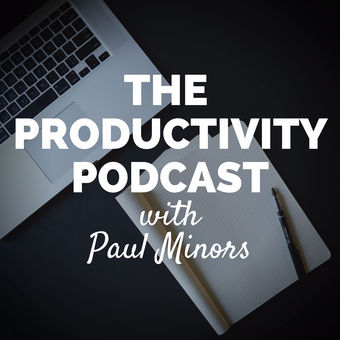 The Productivity Podcast: Time Management, Motivation, Business, Self-Help and Happiness
The Productivity Podcast: Time Management, Motivation, Business, Self-Help and Happiness
Your feedback is valuable to us. Should you encounter any bugs, glitches, lack of functionality or other problems, please email us on [email protected] or join Moon.FM Telegram Group where you can talk directly to the dev team who are happy to answer any queries.